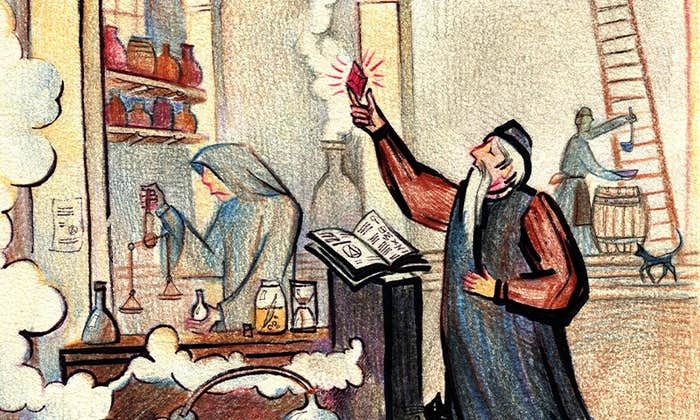I ascribe the Success of our Revolution to a Galaxy,” Benjamin Rush wrote to John Adams, in 1812. He wasn’t invoking the astrological. It was commonplace then to associate a bright assembly of people with the starry band in the night sky that Chaucer called “the Milky Wey.” Yet Rush crossed out “a Galaxy” and wrote in, perhaps for the sake of specificity, “an Illustrious band of Statesmen—philosophers—patriots & heroes.” Historian Jill Lepore has written that, in the “comic-book version of history that serves as our national heritage, where the Founding Fathers are like the Hanna-Barbera Super Friends, Paine is Aquaman to Washington’s Superman and Jefferson’s Batman.” And Rush? I posed this question to Stephen Fried, author of the recent book, Rush: Revolution, Madness & the Visionary Doctor Who Became a Founding Father. Fried replied, “Dr. Strange.”
An apt choice. Rush was a strange, or a strangely gifted, man, and one of the youngest—at 30—to sign the Declaration of Independence. Mentored by his fellow Philadelphian Founding Father Benjamin Franklin, Rush would become a towering intellect with a remarkable admixture of passions. In his twenties, politics was a minor one—medicine and chemistry were his strong callings—but a quiet association he maintained with the Philadelphia Sons of Liberty turned fateful when, one summer day in 1774, he was invited to join in the welcoming of the delegations for the first Continental Congress. He would make lasting impressions on Washington and Adams, among others, participating in conversations, some he hosted at his home, of fervid patriotism, cross-pollinating ideas of how to advance the revolution. It would lead Rush to task Thomas Paine with writing, and he editing, what would be called Common Sense, an anti-monarchical and pro-Independence pamphlet.
During the Revolutionary period and afterward, Rush was one of the most preeminent physician-scientists alive (Rush University Medical Center, in Chicago, is named after him). He lent his fierce pen to a variety of social causes, among them emancipation for America’s slaves and rigorous education for girls and women. Though a Christian, Rush was religiously tolerant of all faiths and a champion of secularism. He encouraged Thomas Jefferson to finish what would become the Jefferson Bible, a non-supernatural reworking of the Old and New Testaments. In Rush, Fried confirms what earlier biographical writings on the doctor had observed: that history misunderstood him, “had not taken him seriously enough as a founder, a writer, a teacher, and a revolutionary in politics, medicine, religion, public health, and philosophy.”
Rush was a founder of American psychiatry. As a scientist, he was fascinated by mental illness; as a doctor, he was horrified by its treatment. Where most saw the workings of God or demons in the manners of the mentally ill, Rush saw malfunctioning parts. It was no sin to be deranged. The mentally afflicted deserved sympathy and sophisticated care. They had “diseases of the brain,” he said, not character flaws of failures of will. Rush was a pioneer in removing psychiatric patients from prison conditions. He unchained them, gave them proper lighting, and had them exercise in the hospital gardens.
One of Rush’s first psychiatric cases, in the 1780s, involved Philadelphia’s most publicly mad woman, an old widower named Hannah Garrett who harbored royal delusions and made a habit of catching flying insects and dismembering them. She’d keep their bodies in a jar “for the presumption of daring to bite the King’s daughter.” Rush diagnosed her with a “grief-induced madness” triggered, in middle life, “by the loss of her husband.” Rush and his staff, as part of her treatment, regularly spoke to her, to try to understand what Rush viewed as her “errors of thinking” in order to heal her.
In 1786, the American Philosophical Society relaunched its annual oration—an occasion for a sterling lecture on a matter of importance—and wanted Rush to give it, in Philadelphia. The city was, at the time, the site of an American Enlightenment. Some of the country’s brightest minds would attend Rush’s talk. Newspapers advertised the event; a thousand tickets were printed. “The subject of the lecture was not announced,” Fried writes. “Dr. Rush himself was the draw.” He knew that nearly everything he’d say would amount to blasphemy for someone he respected, because his subject was “An enquiry into the influence of physical causes on the moral faculty,” the moral faculty being the “power in the human mind of distinguishing and choosing good and evil…virtue or vice.”
Rush denounced the prescription of prayer and clerical scoldings for those suffering mental ailments. These are, he said, “only to be cured by medicine…[and] laws for the suppression of vice and immorality will be as ineffectual as the increase and enlargement of jails.” He also speculated on, among other things, suicidal thinking as a kind of contagion “often propagated by means of newspapers,” anticipating contemporary discussions about how media should report on people taking their own lives. His peroration would resonate with anyone today intrigued by the implications of genetics on innate talent and behavior:
I am not so sanguine as to suppose that it is possible for man to acquire so much perfection from science, religion, liberty and good government as to cease to be mortal; but I am fully persuaded that from the combined actions of causes, which operate at once upon the reason, the moral faculty, the passions, the senses, the brain, the nerves, the blood and the heart, it is possible to produce such a change in the moral character of man, as shall raise him to a resemblance of angels—nay more, to the likeness of God himself.
Decades later, Rush would flesh out this thesis in Medical Inquiries and Observations, upon the Diseases of the Mind. In a letter to John Adams, Rush explained that he’s attempting “to show that the mind and the body are moved by the same causes & Subject to the same laws.” He viewed psychological vigor as a product of the brain, a vulnerable and comprehensible organ, subject to damage and decay that could diminish moral conduct. He expected his peers to give him no shortage of criticism. “But time I hope will do my Opinions justice,” he wrote. “I believe them to be true and calculated to lessen some of the greatest evils of human life.”
Rush was right, of course. The brain controls our behavior, moral or not. If it is injured, or if we’re subject to certain stimuli, our ethics can be affected. As Columbia University clinical psychiatrist Carl Erik Fisher once told Nautilus, “What makes someone a pedophile or struggle with sexual impulses if not their brain? And, if the locus is in their brain, then what makes their responsibility any more or less than someone who has a tumor? A hundred years from now we may be able to talk about brain function in a deterministic way, even if there’s not such a clear obvious organic issue.”
Rush wasn’t as prescient about other matters. He infamously suggested, for example, that Africans’ dark skin was a hereditary form of leprosy. And in his own time he was excoriated for his practice of bloodletting, which he believed to be efficacious up until his own death, having performed it on himself. But he argued well and early for the benefits of basic sanitation in general, and in hospitals in particular. Maintaining health was always as crucial as upholding dignity. To his hospital’s board, he wrote that using dungeon-like cells “any longer for the reception of mad people will be dishonorable both to the Science and Humanity of the city of Philadelphia.”
Brian Gallagher is the editor of Facts So Romantic, the Nautilus blog. Follow him on Twitter @BSGallagher.


























